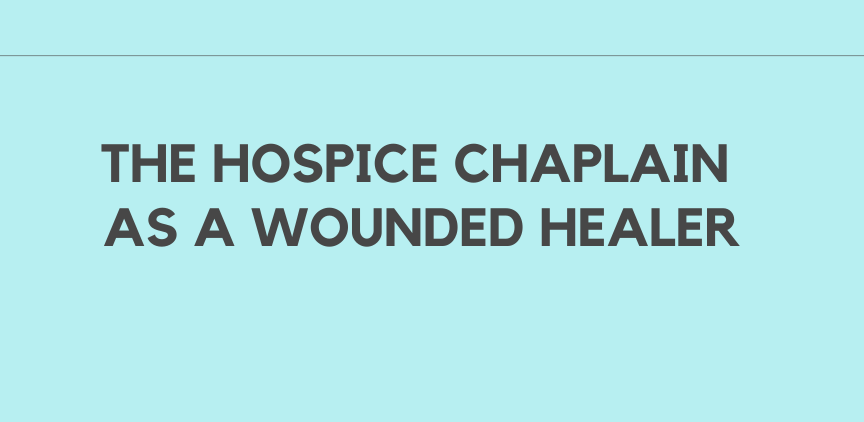Saul Ebema, DMin
I am a wounded healer!
In 1972, Henri Nouwen, wrote a book that challenged pastoral counselors like hospice chaplains to make their own emotional wounds a source of healing for the patients they provide counseling for. He titled his book “The Wounded Healer.” That book has played a big part in the formation of my theology of care.
Although the concept of the wounded healer predated Henri Nouwen’s book, the book’s title captured, in a phrase, a powerful aspect of the therapeutic relationship much needed in our work as hospice chaplains.
There has been a lot of research on different therapeutic interventions and theories that work well in our work of ministering to the dying and their loved ones. But I love the concept of the hospice chaplain as a wounded healer. I believe that, a hospice chaplain who is aware of, and has worked to accept his/her own wounds, has much to offer the hospice patient and their loved ones.
I believe that, a hospice chaplain who is aware of, and has worked to accept his/her own wounds, has much to offer the hospice patient and their loved ones.
Tweet
I remember one day visiting a hospice patient in her home. She was being taken care of by her elderly husband. During my visit, she confided in me about her broken relationship with her son whom she had not spoken to in 12 years. With tears rolling down her eyes, she spoke about the pain it has caused her. According to her, she attempted to reconcile with him, but he never accepted.
As I was listening to her while she told the story, I was feeling her pain. I offered to speak to him. She was reluctant to give me his number because she thought nothing would come of it, but she eventually did give me his number. I called him and we scheduled to meet the following day at a local coffee shop. During our meeting, he kept saying things like, “I don’t care about my parents anymore, I have moved on with my life,” and so forth.
I realized that we would not go anywhere with this conversation. Then I began to share with him little pieces of my life story. How my parents were murdered in front of me at 12 years old. How I had to end up in a refugee camp and then kidnapped at 15 years old to fight as a gorilla soldier for 6 years. How I missed my parents and how I longed for that feeling of parental affection.
Next thing I know, he was crying and apologized for being petty and disrespecting his parents. He immediately got up, thanked me for helping him and drove straight to his parents’ home and reconciled with his them.
There are countless times where I have shared little pieces of my life to help those dealing with death and dying, bereavement etc. and have seen great outcomes. Of course, it takes discernment to know when your personal experience can provide healing rather than damage the patient.
Conventional wisdom in the counseling field holds that sharing personal experience will interfere with required objectivity in the counseling process. It is often said that a subjective view will produce fractured treatment, counter-transference issues, and unhealthy end results. Sometimes this is true.
From my personal experience in hospice ministry, this is not always so. Personal experience with bereavement, and good restorative grief work, can lead to excellent therapeutic alliances and impressive outcomes for hospice patients and their loved ones.
I do not believe that the hospice chaplain should pursue objectivity as the highest goal in the therapeutic process. Personally, my highest goal in any therapeutic process is the formation of a therapeutic partnership with the person I am counseling because good rapport matters. The therapeutic process with a hospice patient and their loved one should involve trust. And trust happens in most cases when you share a little bit of yourself, your story, and your personal experiences.
The practice of hospice chaplaincy is often the purchase of friendship. Do not look at this statement as a bad thing. While the focus of our therapeutic intervention is the patient and only the patient’s life is discussed in detail. The hospice chaplain as a wounded healer should freely add vignettes from his or her own life, in relation to clarifying a patient situation or comments to help provide healing.
I have a healthy appreciation for objectivity in the counseling process, but it is not the primary goal in effective counseling in hospice chaplaincy. I agree with Sharon K. Farber that “a judicious use of self-disclosure, when done to meet the needs of the patient, adds a most human and needed dimension in the counseling process and can enhance the attachment bond and lead to great outcomes”

Leave a comment